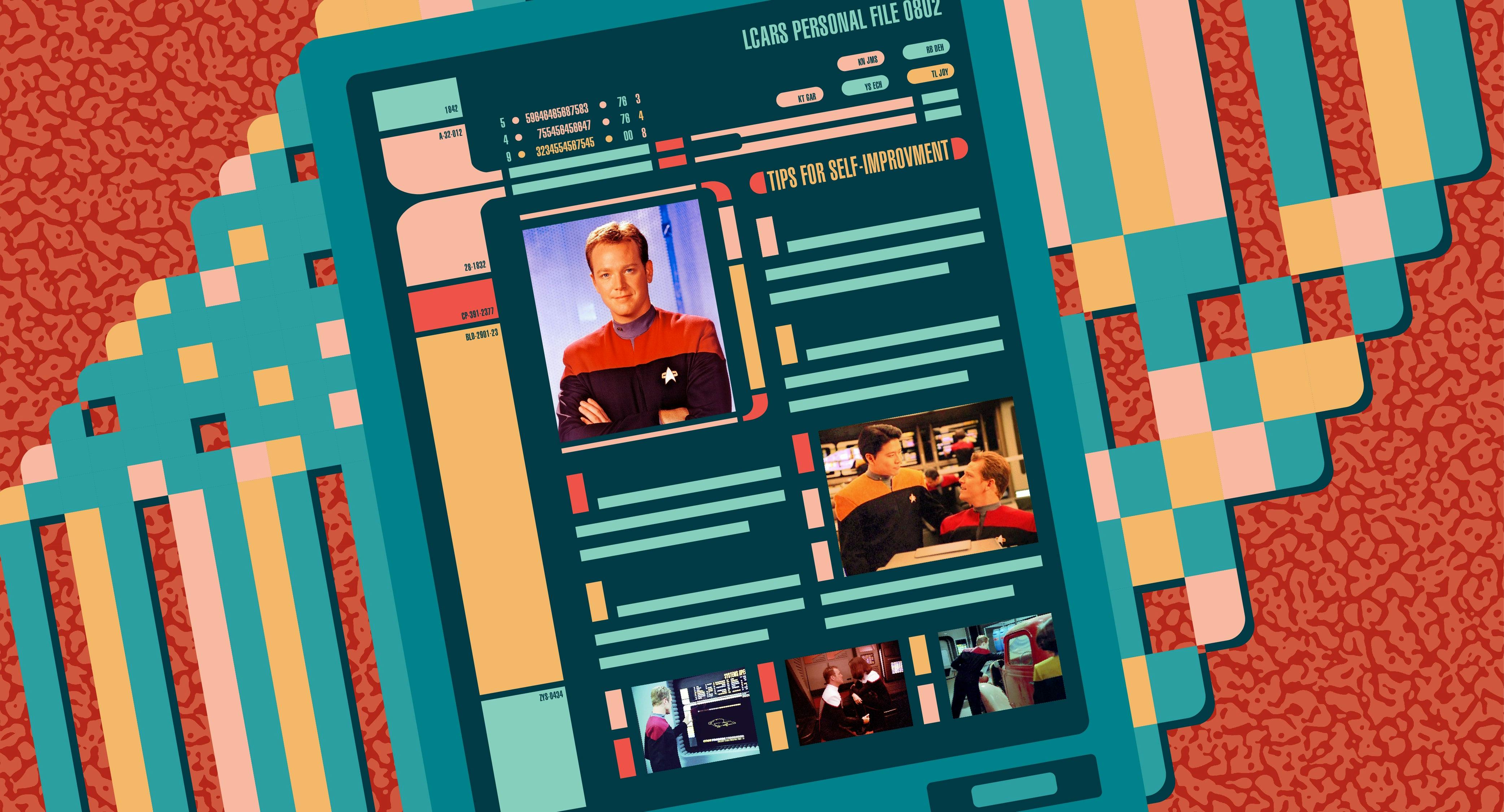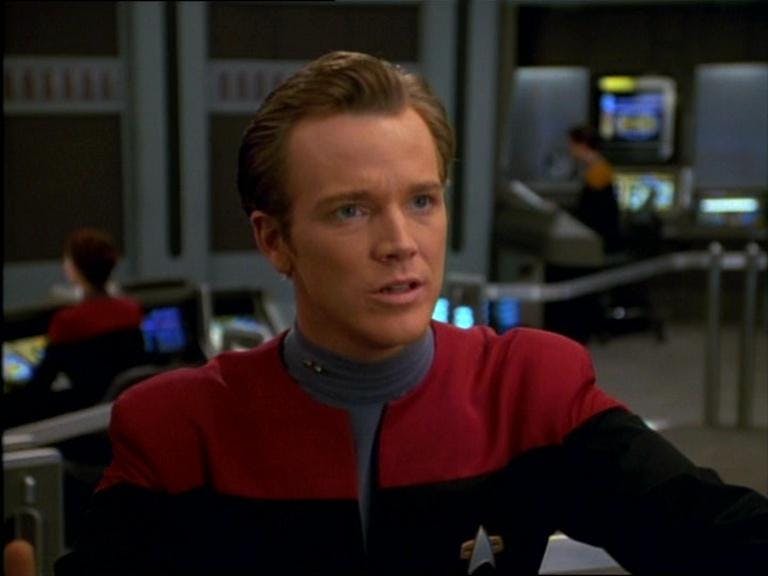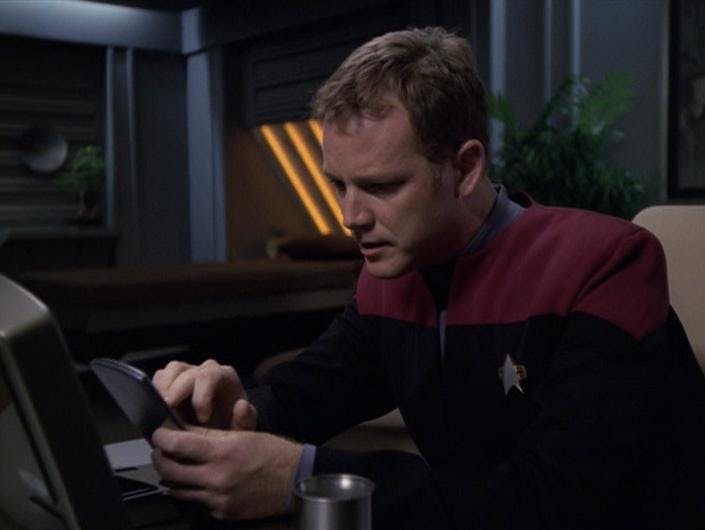Published Nov 9, 2023
Tom Paris Presents His Top 10 Tips for Self-Improvement
If your goal is personal growth, consider learning from Voyager's helmsman.

StarTrek.com
In parallel with the end of the Cold War between America and the Soviet Union in the late 1980s and early 1990s, the Star Trek universe of the time offered us a cornucopia of military heroes. Jean-Luc Picard was defined by his moral certitude, Worf by his quest for honor, and Odo by his commitment to justice.
But a man like Tom Paris, helmsman aboard the U.S.S. Voyager, was designed as an anti-hero from the start — a betrayer, coward, and womanizer, with an arrogant streak to boot. While viewers learned much from Data’s exploration of humanity in Star Trek: The Next Generation, provided their audience with a character they could draw lessons from as he, already well acquainted with humanity, worked towards becoming a better person.
Looking back on Paris' journey of self-improvement, I like to think he would have the following recommendations:
1. Admit Responsibility
Admit Responsibility - Star Trek: Voyager
Admitting you have a problem is the first step in creating substantial and sustainable change, and Paris was ready to acknowledge his screw-ups. In his first interaction with Captain Janeway in “,” Paris confessed to his lack of loyalty, admitting that he was “willing to fight for anyone who'd pay [his] bar bill.” He accepted Janeway’s offer of being an “observer” in exchange for assistance at his upcoming parole hearing, but his admission heralded the beginning of his turnaround. Paris confronted his past again and again.
As he put it to Neelix in “,” “Everything you heard those guys saying about me, well, it was true. But it's not who I am anymore. At least not who I want to be. This upside down mission to the wrong side of the galaxy has given me a second chance, and I don't intend to blow it.”
2. Act Selfless

StarTrek.com
At the end of “Caretaker,” Paris takes a step towards repairing his relationship with Chakotay by saving him from falling down an Ocampan staircase. As with Janeway’s offer, this interaction was still transactional. In his own words, “If I save your butt, your life belongs to me. Isn’t that some kind of Indian custom?” (A line that likely wouldn't occur in 21st Century programming, at least not without follow-up.)
To really show growth, Paris needed to show selflessness. He was given the opportunity in “.” Though he had several unpleasant interactions with the dogged little journalist Latika, who accused him of being a demon, when push came to shove, Paris took a bullet for the boy.
3. Develop Friendships
Develop Friendships - Star Trek: Voyager
Gaining the grudging respect of shipmates like Chakotay was critical to Paris’s absolution, but developing friendships was essential to his evolution. Paris’ friendship with Ensign Harry Kim is the most meaningful, not least because in him, Paris found qualities to emulate. As he related to Kim in “,” “Since I’ve been on Voyager, I’ve tried to be more like you.... You’re my role model. You’re reliable, hardworking, extremely punctual. Did I mention polite?”
4. Get Serious about Relationships
Get Serious About Relationships - Star Trek: Voyager
One could argue that, with his effortless charm and good humor, Paris was always a candidate for new friendships. He was not as good a candidate for serious relationships. In “Caretaker,” Lieutenant Stadi accused him of flying at her at warp speed. In “,” Paris rudely suggests that there is no discernible difference between the Delaney sisters. And let us not forget a shady past involving “rescuing slave girls from Planet Ten,” as recounted in the episode “.”
It is impossible to detail everything Paris learned from B’Elanna Torres about initiating and maintaining lasting romance, but it all started with overcoming base instincts in “.” Despite his longtime efforts to win her over up until that point, Paris deflects B’Elanna’s advances toward him in an alien cave, wistfully hoping that she will someday return his affection. The scene proves that he is first and foremost a decent human being, but also that he fundamentally understands the difference between sexual gratification and love.
5. Leverage History
Leverage History - Star Trek: Voyager
Changing how you relate to others is not the only way to gain respect. On several occasions, Paris found a way to apply his expertise in 20th-Century history to ship problems. In “,” he identified a 1936 Ford truck floating in space, which enabled a meeting with Amelia Earhart and an inspirational group of human settlers.
His historical knowledge was useful for tactical discussions as well. When Voyager ran into a space station operated by Species 8472 and modeled on Starfleet headquarters, Paris was the first to suggest that the facility was likely used as a training camp, much as “the Soviets used to build American towns.” And lest we forget, Paris’s somewhat flawed but still adequate knowledge of 20th-Century technology, customs, dress, and pop culture was essential to the crew’s success in escaping the 20th Century itself in “.”
6. Develop an Artistic Side
Being a Renaissance man is not the same as being a good person, but developing a diverse set of skills can help us be our best. Although several Voyager crew members dabbled in holo-programming, Tom Paris developed a knack for creating some of the most memorable environments. Who can forget Chez Sandrine, the Marseilles bar used by the crew as a base of operations in “”?
And then there was The Adventures of Captain Proton, which allowed Voyager to interact with photonic life forms, albeit after some of them were accidentally killed by Doctor Chaotica. Of course, the Paris program that had the most impact on shipmates’ lives was Fair Haven. Paris’ open-door policy eventually had to go, but many among the ship’s crew formed lasting friendships in the quaint seaside Irish town. In “,” they even re-imagined what relationships with holodeck characters could be after an uprising by townsfolk forced Janeway to take their out-of-place leader for a stroll through Voyager.
7. Learn to Express Feelings
Learn to Express Feelings - Star Trek: Voyager
Paris was known for being a lighthearted joker; but while his sarcastic wit was an audience favorite and earned a few eye rolls from the Voyager crew, it was sometimes less than helpful in serious situations. This is why it was important for Paris to learn sincere expression of feelings.
In one memorable instance in “Parturition,” Paris put to rest nearly a season and a half of competition with Neelix over Kes, “To be honest, if you weren't around, I'd be knocking at her door. But I respect you, Neelix. And that's that.”
The real talk Paris initiated with B’Elanna Torres about their marriage in “” was even more dramatic and effective. After shutting down the engines of the Delta Flyer in the middle of a race, Paris simply states, “If we’ve got a problem, we’re going to resolve it right here, right now,” and later “the only self I want to be is the guy you’re in love with.”
8. Take Initiative

StarTrek.com
Paris also learned to take initiative, a quality that separates leaders from followers. To be sure, some of his initiatives — such as volunteering to renovate a junk shuttle in “” — went very awry. On several occasions, however, Paris made exceptional contributions.
In “,” Paris pushed to pilot a shuttle that would attempt to break the transwarp barrier, at great personal risk. Although there were side effects, the flight and Voyager went down in the history books as a result. Later, the decision to build the Delta Flyer, one that Paris strongly advocated for, was instrumental to Voyager’s success in a variety of subsequent missions.
9. Fight for Honor
Fight for Honor - Star Trek: Voyager
Had Lieutenant Commander Worf been acquainted with Tom Paris at the series’ outset, the former would probably have said he is “without honor.” All that would have changed when he found out that Paris accepted a duel with the Klingon T’Greth in “.” The duel was ultimately fought with blunt bat’leths, but Paris’ willingness to fight to the death for honor represented a marked shift from the man who had once ran away from his problems.
10. Stand Up for Your Beliefs
Stand Up for Your Beliefs - Star Trek: Voyager
There was no greater test for Paris than the one presented by Voyager’s encounter with the Monean Maritime Sovereignty and its ocean planet in “.” After it becomes clear that Monean authorities will not make adjustments to their environmentally harmful oxygen mining operations, Paris hatched a plan to damage these facilities so that they are rebuilt in a more sustainable way.
Paris was narrowly stopped by Janeway, who stripped away his rank and threw him into solitary confinement for a month. At first glance, Paris’ actions seem to go against every promise he made to “reinvent” himself. And yet — as with The Doctor’s occasional disobedience — this act of rebellion highlighted just how far Paris had come. A man of no principles had become a man that was willing to lay down his life for them.





